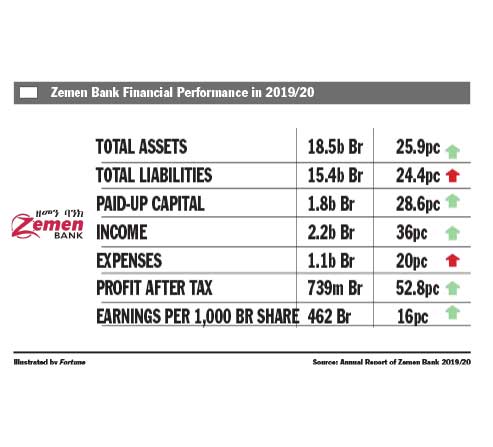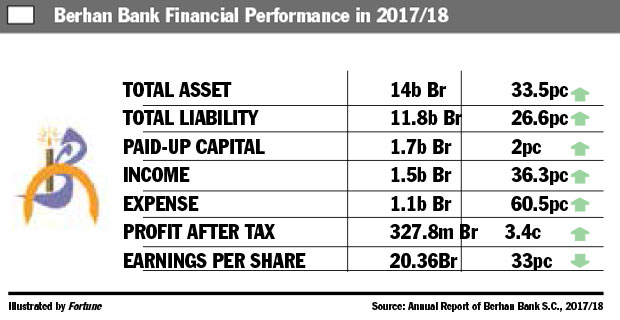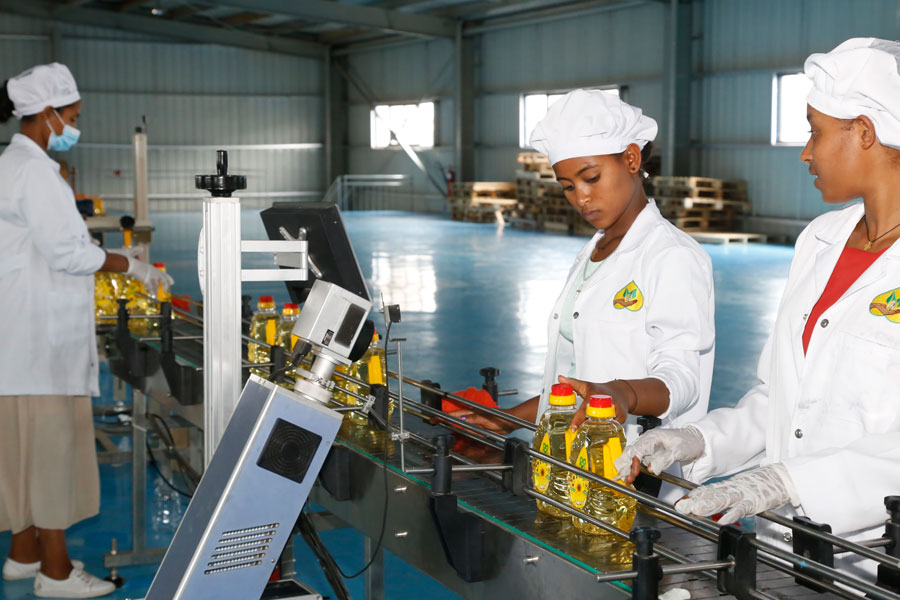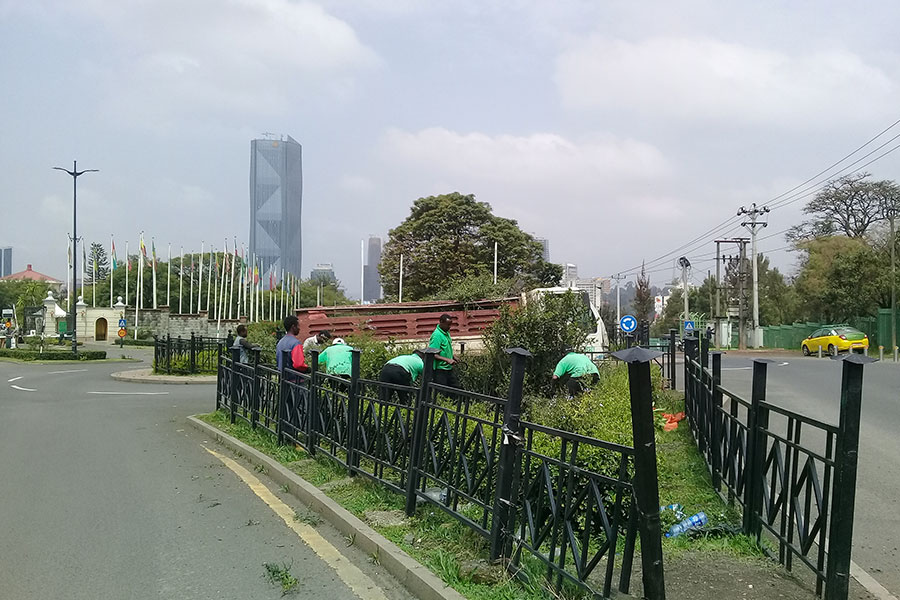
Shareholders have little to celebrate from Wegagen Bank's operations last year as profits plummeted, eroding shareholders' return on their investment. Disruptions due to the civil war in the north, where Wegagen has a significant presence in Tigray Regional State, are partly to blame for the shoddy performance.
Wegagen remains to register a marginal profit of 126 million Br in its operation of 2020/21 but dropped by 85pc from the previous year. It is a decline barely seen in the industry, dragging shareholders' returns to 4.2pc from 31.3pc. It is an unprecedented development that many of the Bank's 4,000 shareholders have not taken too kindly.
“The disappointing returns have to be among the lowest in the financial sector,” said a shareholder who joined Wegagen in 2005, buying 115,000 Br worth of shares.
The banking industry's average return on shareholders' investment stands at 32pc.
The slump in returns will harm the Bank’s efforts to meet the capital requirement set by the central bank, raising equity from the public. Shareholders will have little to recapitalise their returns and boost the Bank’s capital, according to Abdulmenan Mohammed, a financial statement analyst based in London.
“The low EPS discourages potential investors from buying shares,” Abdulmeman said.
The National Bank of Ethiopia (NBE) increased the minimum paid-up capital threshold for banks 10-fold to five billion Birr last year. Banks such as Wegagen, which was incorporated in 1997, are required to comply with the requirement by the end of 2025. Awash Bank and the Bank of Abyssinia are the only banks to have exceeded the requirement, amassing a paid-up capital of 8.2 billion Br and 5.2 billion Br, respectively. An injection of 400 million Br brought Wegagen's paid-up capital up to 3.3 billion Br by the end of the last fiscal year.
Despite the setback, Wegagen's executives remain buoyant the Bank will meet the threshold and reclaim its mid-tier status. The Bank had been floating shares to the public, adding a 20pc premium, according to Afework Gebretsadik, director of marketing.
"This is now reduced to five percent to attract buyers, which is proving effective," he said.
A staggering 410pc surge in loan impairment charges to 789.5 million Br was the primary culprit behind the drop in profits.
Abdishu Hussien, Wegagen's chairperson, told a shareholders' meeting at the Hilton in December 2021 the adverse effects of COVID-19 and the armed conflict in the north resulted in the closure of almost one-third of the Bank’s branches and the deterioration of a large portfolio of assets.
“This put a significant dent in profitability,” said Abdishu.
Over a quarter of the Bank's 398 branches are located in Tigray, largely cut off from the rest of the country since November 2020. The closure of branches in Tigray put pressure on Wegagen's deposit mobilisation. It increased by only five percent to 31.5 billion Br, a stark contrast to the industry, which saw a 25pc jump to an aggregate deposit of 1.3 trillion Br last year.
Wegagen is working to boost deposits, attracting new customers, Afework disclosed. It saw over half a million accounts opened last year, bringing the total to 2.3 million depositors during the reporting period.
In the face of shrinking deposit growth, loans and advances reached 26 billion Br, leading its loan-to-deposit ratio to jump to 82pc from 77.4pc. According to the financial expert, although the ratio has yet to get to an alarming level past 90pc, it is high enough to cause liquidity problems.
The slow growth of lending activities led to a marginal increase in income. Wegagen earned five billion Birr in income, a 13pc increase from the previous year. This pushed interest income, which accounts for 78pc of total revenues, by 22pc to 3.9 billion Br.
Unlike interest-bearing activities, non-financial intermediation performed negatively. Net fees and commissions declined by eight percent to 1.1 billion Br while other operating income dropped by 5.5pc to almost 26 million Br.
Wegagen also recorded staggering losses in its foreign exchange dealings for the second year in a row. It saw losses of 269 million Br, nearly triple the 107 million Br it shed in 2019/20.
The Bank is taking the initiative to enhance forex generation, according to Afework.
“These include strengthening relationships with exporters, NGOs, and correspondent banks as well as international money transfer agents," he said.
A large expansion in expenses exacerbated the poor performance on the income front. Wegagen's costs ballooned by 44pc to 4.8 billion Br. Expense on interest, which accounts for 45.5 of the total, grew by 25pc to 1.5 billion Br. Salaries and benefits paid by Wegagen to close to 5,000 employees was 1.5 billion Br, soared by 36pc.
"Although there is no operation in Tigray, we still pay our employees that were working at the Bank's 112 branches in the region," said Afework.
The good news for shareholders would come from Wegagen's asset value of 39.7 billion Br, growing by four percent. However, the ratio shows that Wegagen’s liquidity level dropped both in value and relative terms. Liquid assets to total assets ratio decreased from 16.5pc to 12pc while liquid assets to total deposits ratio also declined from 21.8pc to 16.6pc. Cash and bank balances fell by 24pc to 4.8 billion Br.
PUBLISHED ON
Jan 15,2022 [ VOL
22 , NO
1133]

Fortune News | Feb 20,2021

Fortune News | Nov 27,2018

Radar | Oct 05,2019

Radar | Feb 01,2020

Fortune News | Jan 07,2024

Radar | Nov 24,2024

Fortune News | Feb 18,2023

Radar | Nov 12,2022

Viewpoints | Jan 03,2021

Radar | Nov 20,2023

Dec 22 , 2024 . By TIZITA SHEWAFERAW
Charged with transforming colossal state-owned enterprises into modern and competitiv...

Aug 18 , 2024 . By AKSAH ITALO
Although predictable Yonas Zerihun's job in the ride-hailing service is not immune to...

Jul 28 , 2024 . By TIZITA SHEWAFERAW
Unhabitual, perhaps too many, Samuel Gebreyohannes, 38, used to occasionally enjoy a couple of beers at breakfast. However, he recently swit...

Jul 13 , 2024 . By AKSAH ITALO
Investors who rely on tractors, trucks, and field vehicles for commuting, transporting commodities, and f...

Jun 28 , 2025
Meseret Damtie, the assertive auditor general, has never been shy about naming names...

Jun 21 , 2025
A well-worn adage says, “Budget is not destiny, but it is direction.” Examining t...

Jun 14 , 2025
Yet again, the Horn of Africa is bracing for trouble. A region already frayed by wars...

Jun 7 , 2025
Few promises shine brighter in Addis Abeba than the pledge of a roof for every family...